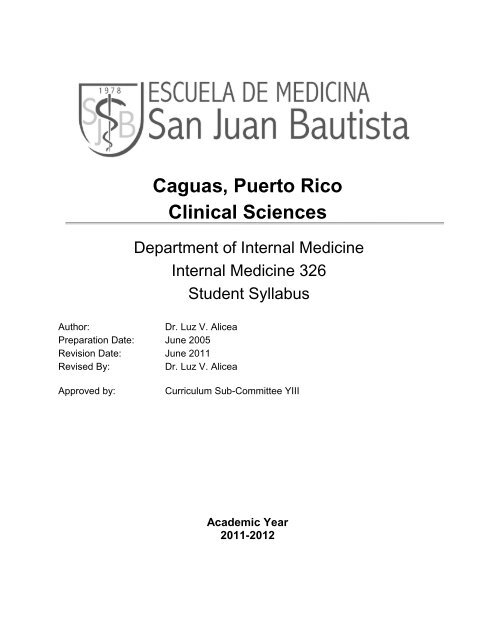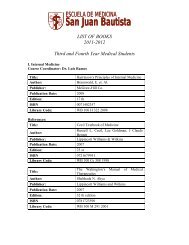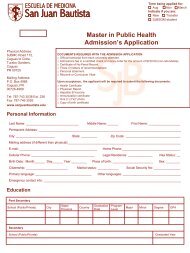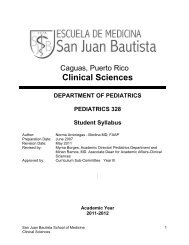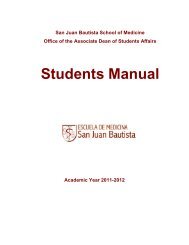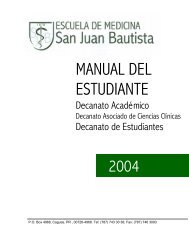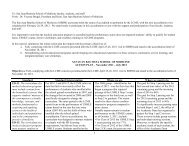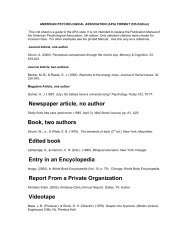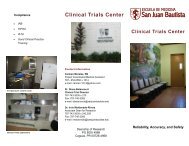Caguas, Puerto Rico - San Juan Bautista School of Medicine
Caguas, Puerto Rico - San Juan Bautista School of Medicine
Caguas, Puerto Rico - San Juan Bautista School of Medicine
You also want an ePaper? Increase the reach of your titles
YUMPU automatically turns print PDFs into web optimized ePapers that Google loves.
<strong>Caguas</strong>, <strong>Puerto</strong> <strong>Rico</strong><br />
Clinical Sciences<br />
Department <strong>of</strong> Internal <strong>Medicine</strong><br />
Internal <strong>Medicine</strong> 326<br />
Student Syllabus<br />
Author:<br />
Dr. Luz V. Alicea<br />
Preparation Date: June 2005<br />
Revision Date: June 2011<br />
Revised By:<br />
Dr. Luz V. Alicea<br />
Approved by:<br />
Curriculum Sub-Committee YIII<br />
Academic Year<br />
2011-2012
Credits: 12<br />
Duration:<br />
Clerkship Sites:<br />
Schedule:<br />
Previous Requirements:<br />
Department <strong>of</strong> Internal <strong>Medicine</strong><br />
Internal <strong>Medicine</strong> 326<br />
Third Year<br />
12 weeks<br />
<strong>San</strong> <strong>Juan</strong> <strong>Bautista</strong> Medical Center/<br />
Ryder Memorial Hospital, Humacao-PR<br />
Monday to Friday: 7:30 am to 4:00 p.m.<br />
Night duty (4:00 p.m. -12:00 a.m.) during weekdays,<br />
holidays (8:00 a.m. – 12:00 a.m.)<br />
Approved Basic Sciences Program<br />
DEPARTMENT DIRECTOR:<br />
Dr Edgardo Cartagena<br />
ACADEMIC DIRECTOR<br />
Dr Luz Vanessa Alicea<br />
COORDINATOR INFORMATION<br />
Pr<strong>of</strong>essor:<br />
Dr. Luis Ramos <strong>San</strong> <strong>Juan</strong> <strong>Bautista</strong> Medical Center, 6 th floor<br />
787-653-0550, ext: 6032 (<strong>San</strong> <strong>Juan</strong> <strong>Bautista</strong> Medical Center)<br />
Dr Alexis Torres, Ryder Memorial Hospital, Humacao<br />
(787) 852-0768 (Hospital Ryder Memorial)<br />
Office hours:<br />
Mondays, Wednesdays and Fridays: 1:00 PM– 4:00 PM<br />
FACULTY INFORMATION<br />
Pr<strong>of</strong>essors:<br />
Dr. José H. Martínez (Endocrinology)<br />
Dra. Luz V. Alicea (Internal <strong>Medicine</strong>)<br />
Dr. Edgardo Cartagena (Pneumology)<br />
Dr. Arnulfo <strong>San</strong>tana (Pneumology)<br />
Dr. Harry Ruíz (Gastroenterology)<br />
Dr. Moisés Ortiz (Nephrology)<br />
Dr. Nelson Montañez (Hematology-Oncology)<br />
Dr. Eddy Mieses (Cardiology)<br />
Dr. José Ramírez Vázquez (Rheumatology)<br />
Dr. Armando Torres (Infectology)<br />
Ryder Memorial Hospital Faculty<br />
Dr Alexis Torres Torres<br />
Dr <strong>Juan</strong> Villavicencio<br />
Dr. Idia Velazquez<br />
Dr. <strong>Juan</strong> C. Ortiz <strong>San</strong>tiago<br />
Dr. Daniel Rodriguez<br />
Internal <strong>Medicine</strong> Attendings:<br />
Dr. Ernesto García<br />
Dr. Eric Pérez<br />
Dr Jahely Marrero<br />
<strong>San</strong> <strong>Juan</strong> <strong>Bautista</strong> <strong>School</strong> <strong>of</strong> <strong>Medicine</strong><br />
Clinical Sciences<br />
1
Rules and Regulations<br />
See Description in the General Rules File<br />
Course Description<br />
The third year Internal <strong>Medicine</strong> clerkship is an important rotation in your<br />
formation as a doctor. We expect that you obtain the greatest benefit from it.<br />
You are expected to learn from each patient, so besides attending the<br />
department educational activities and conferences you are expected to learn<br />
from each patient. You should be involved in every aspect <strong>of</strong> your patient’s care<br />
from taking a history and making a physical exam to observing studies that they<br />
undergo (when possible). You are a part <strong>of</strong> the medical team. We expect that<br />
you read about medical issues every day since there is something to be learned<br />
from every patient on the service.<br />
You are expected to take the initiative on all aspects <strong>of</strong> your learning, which<br />
includes actively seeking feedback, participating in discussions and spending<br />
time with your patient.<br />
The oral presentations provide an opportunity to work on presentations skills<br />
before an audience. You are responsible for case presentations as well as<br />
theme presentations as assigned by your coordinators. We expect that you<br />
come prepared for oral presentations, presenting findings in an organized form<br />
and be prepared to answer questions related to the case.<br />
Please dress pr<strong>of</strong>essionally at all times, be on time, be polite and respectful to<br />
your patient’s and colleagues at all times. You are expected to do your own work<br />
and remember all patient information is confidential.<br />
We expect you obtain the greatest benefit from our department.<br />
A. GENERAL<br />
OBJECTIVES<br />
1. Evaluate patients hospitalized with acute illness<br />
2. Effectively care for patients as part <strong>of</strong> an inpatient medical team<br />
3. Initiate a management plan for important internal medicine problems<br />
4. Evaluate patients in a medical subspecialty clinic<br />
5. Develop skills that foster life long learning habits and personal reflection<br />
6. Develops an understanding <strong>of</strong> resources needed by patients and the<br />
limitations <strong>of</strong> the current health care system including the <strong>Puerto</strong> <strong>Rico</strong><br />
Health reform<br />
Escuela de Medicina <strong>San</strong> <strong>Juan</strong> <strong>Bautista</strong><br />
Clinical Sciences<br />
2
7. Establish rapport with the patient and his family in accordance with the<br />
basic ethical standards using proper language, patience, respect and<br />
human compassion<br />
8. Reinforce the self study practice as fundamental method <strong>of</strong> continuing<br />
medical education.<br />
9. Develop skills in oral presentation techniques<br />
B. SPECIFIC<br />
1. Obtain and record a patient’s history in a logical, organized and thorough<br />
manner.<br />
2. Perform and record a physical examination in a logical, organized and<br />
thorough manner<br />
3. Obtain and understand important supplemental information including CBC,<br />
serum chemistries, ECG, chest x-rays and urinalysis<br />
4. Describe criteria used in evaluating a chest film to be technically<br />
adequate. Be able to recognize important radiologic finding in important<br />
clinical entities<br />
<br />
<br />
<br />
<br />
Congestive heart failure<br />
Pleural effusion – lateral decubitus x rays<br />
Infectious processes<br />
Degenerative joint disease, RA<br />
5. Formulate a problem list and a differential diagnosis based in the history,<br />
physical examination, and test data, and use the differential diagnosis to<br />
guide initial diagnostic evaluation.<br />
6. Orally present a new patient’s history and physical examination clearly<br />
and with appropriate detail<br />
7. Orally present a follow up <strong>of</strong> a patient’s case in a focused manner,<br />
including diagnostic and therapeutic plans.<br />
8. Work as an effective member <strong>of</strong> the patient care team, demonstrating<br />
reliability, initiative, organization and helpfulness.<br />
9. Learn and practice the interdisciplinary approaches directed to patient<br />
health attention, prevention and promotion such as subspecialty<br />
evaluation, nutritional evaluation, etc.<br />
10. Establish effective communication so as to identify and respond to each<br />
patient’s emotional needs and their personal desires regarding their<br />
medical treatment<br />
11. Write clear progress notes documenting status <strong>of</strong> diagnostic evaluation<br />
and therapeutic plans.<br />
Escuela de Medicina <strong>San</strong> <strong>Juan</strong> <strong>Bautista</strong><br />
Clinical Sciences<br />
3
12. Learn and practice common medical procedures in Internal <strong>Medicine</strong>.<br />
Perform venipuncture and arterial puncture. Observe and performs as<br />
many procedures as possible<br />
<br />
<br />
<br />
<br />
<br />
<br />
<br />
<br />
EKG<br />
CVP<br />
Tracheal intubations<br />
Venous puncture<br />
Starting IV infusion<br />
NGT<br />
ABG<br />
Catheterization <strong>of</strong> bladder<br />
13. Access and utilize information resources to help develop an appropriate<br />
plan <strong>of</strong> care to common and uncommon medical problems.<br />
<br />
<br />
<br />
<br />
<br />
<br />
<br />
<br />
<br />
<br />
<br />
<br />
<br />
<br />
<br />
<br />
<br />
<br />
<br />
thrombo embolic disease<br />
arrhythmia recognition<br />
unstable angina<br />
anemia<br />
acid /base disorders<br />
acute renal failure<br />
respiratory failure<br />
acute myocardial infarction<br />
lower respiratory tract infection<br />
hyperlipidemia<br />
chronic obstructive pulmonary disease/bronchial asthma<br />
peptic ulcer disease<br />
congestive heart failure/ valvular heart disease<br />
rational use <strong>of</strong> antibiotics<br />
joint pain<br />
acute/chronic liver disease<br />
overview <strong>of</strong> oncology<br />
thyroid disorders<br />
electrolyte disorder<br />
Escuela de Medicina <strong>San</strong> <strong>Juan</strong> <strong>Bautista</strong><br />
Clinical Sciences<br />
4
common geriatric issues<br />
Diabetes mellitus I and II<br />
Hypertension<br />
GI bleeding<br />
Pancreatitis<br />
Disorders <strong>of</strong> coagulation<br />
14. Apply an evidence based approach to addressing questions that arise in<br />
the clinical setting.<br />
15. Self-asses clinical strengths ad weakness and formulate a plan for<br />
improvement.<br />
16. Reflect on patient- related questions as they arise, and develop a system<br />
that can be applied to future practice, to search for answers in the medical<br />
literature.<br />
17. Reflect on difficult ethical or pr<strong>of</strong>essional issues and develop constructive<br />
ways to handle them.<br />
18. Identify situations specifically related to your position as a physician-in<br />
training and become familiar with some respected opinions regarding this<br />
issue.<br />
ACTIVITIES SCHEDULE<br />
A. TIME DISTRIBUTION<br />
The Internal <strong>Medicine</strong> Third Year Rotation has twelve weeks distributed as<br />
follows:<br />
60 % General Internal <strong>Medicine</strong> Ward<br />
30% Emergency Room (On duty assignments)<br />
10% Outpatient<br />
B. DAILY PROGRAM*<br />
TIME<br />
ACTIVITY<br />
7:30-9:00 am Morning Report<br />
9:00-12:00 n Ward Rounds<br />
12:00-1:00 p.m. Lunch time<br />
1:00-4:00 p.m. Patient care activities or Interactive lecture<br />
4:00 pm-12:00 am Night Duty<br />
Thursdays from 1 to 4 PM self study<br />
The schedule may change according to the place.<br />
Escuela de Medicina <strong>San</strong> <strong>Juan</strong> <strong>Bautista</strong><br />
Clinical Sciences<br />
5
CORE CURRICULUM<br />
The core curriculum for Third year Medical Students is divided in organ system<br />
disease blocks, each <strong>of</strong> one includes the core topics that should be learned in<br />
this formation level. All the topics will be referenced to Harrison’s textbook <strong>of</strong><br />
Internal <strong>Medicine</strong>, 17 TH<br />
edition. The following table includes the blocks,<br />
corresponding topics, chapters, and page numbers in the textbook.<br />
Some <strong>of</strong> the topics will be presented in conferences. All the topics will be<br />
included in the exams.<br />
Subject Content<br />
The following list includes the core topics and pertinent chapter from the<br />
reference textbook that, must be covered during the clerkship. The methodology<br />
to study these topics may include, but is not limited to conferences, presentations<br />
by students, seminars, discussions, Team Based Learning, case based<br />
discussions.<br />
• Coronary Artery Disease: Chapters 235 to 240<br />
• Hypertension Cardiovascular Disease: Chapter 241<br />
• Congestive Heart Failure: Chapters 227, 231<br />
• Arrhythmias: Chapters 221, 224-226<br />
• Infectious Endocarditis: Chapter 118<br />
• Pneumonia: Chapter 251<br />
• Chronic Obstructive Pulmonar Disease and Asthma: Chapters 248, 254<br />
• Pulmonary Thromboembolism: Chapter 256<br />
• Neoplasms <strong>of</strong> the Lung: Chapter 85<br />
• Peptic Ulcer Disease: Chapter 287<br />
• Gastrointestinal Bleeding: Chapter 42<br />
• Cirrhosis: Chapter 302<br />
• Acute and Cronic Pancreatitis: Chapter 306, 307<br />
• Inflammatory Bowel Disease: Chapters 306, 307<br />
• Fluid and Electrolyte Disturbances: Chapter 46<br />
• Acid-Base Disorders: Chapter 48<br />
• Acute Renal Failure: Chapter 273<br />
• Chronic Renal Failure: Chapter 274<br />
• Anemia: Chapters 98 - 102<br />
• Leukemia: Chapter 104<br />
Escuela de Medicina <strong>San</strong> <strong>Juan</strong> <strong>Bautista</strong><br />
Clinical Sciences<br />
6
• Lymphoma: Chapter 105<br />
• Disorders <strong>of</strong> Coagulation: Chapters 109 - 112<br />
• Diabetes Mellitus and Hypoglycemia : Chapters 338 - 339<br />
• Thyroid Disorders, Adrenal Disorders: Chapters 336 - 337<br />
• Osteoporosis: Chapter 348<br />
• Cerebrovascular Disease: Chapter 364<br />
• Seizures and Epilepsy: Chapter 363<br />
• Alzheimer Disease and Other Dementias: Chapter 365<br />
• Parkinson’s Disease: Chapter 366<br />
• Meningitis: Chapter 376<br />
• Systemic Lupus Erythematosus: Chapter 313<br />
• Rheumatoid Arthritis: Chapter 314<br />
• Scleroderma: Chapter 316<br />
• Vasculitis Syndromes: Chapter 319<br />
• Osteoarthritis: Chapter 326<br />
Escuela de Medicina <strong>San</strong> <strong>Juan</strong> <strong>Bautista</strong><br />
Clinical Sciences<br />
7
METHODOLOGY<br />
• Formal Case Presentations:<br />
• Four cases must be presented and should be worked up to an assigned<br />
attending. (Three cases at SJBMC and 1 at Ryder Hospital). This<br />
exercise involves the presentation <strong>of</strong> four actual, non simulated patients<br />
to our faculty.<br />
• Cases must include both oral and written presentation.<br />
• Presentations will have the following requisites:<br />
• The student should make an appointment with the assigned proctor at<br />
least ten days before the presentation.<br />
• Patients should have different pathologies<br />
• Cases must be hand written using the complete (long descriptive<br />
form) format <strong>of</strong> clinical history.<br />
• Students should present complete history and physical exam,<br />
differential diagnosis and, suggested complete diagnostic workup and<br />
should be prepared to discuss a summary <strong>of</strong> all the conditions<br />
included in the differential diagnosis.<br />
• Clinical cases to be presented must be preferentially from patients<br />
admitted during call day or in ward. The student should provide the<br />
record number and patient’s initials.<br />
• Cases presented at the morning report will not be accepted fro clinical<br />
presentation.<br />
• These presentations are individual and information should be not shared<br />
between students. If identical cases are presented by different students,<br />
each <strong>of</strong> them will obtain 0 (zero) in the presentation. In addition, they will<br />
be referred to the Associated Dean for Students Affairs for pertinent<br />
actions.<br />
• The deadline for case presentations (4 cases) is before or at the end <strong>of</strong><br />
the clerkship.<br />
• The list <strong>of</strong> assigned cases will be posted at the Internal <strong>Medicine</strong> Office at<br />
each clerkship site.<br />
• Theme presentations to be evaluated by the student coordinator.<br />
• Mini-clinical evaluations during attending rounds.<br />
• The 3rd year students will follow up to 4 patients on ward and no more than<br />
3 new patients in 48 hours.<br />
• Lectures<br />
• Daily morning reports discussions – Proctor in charge: Dr. Cartagena and<br />
diverse faculty members<br />
• Daily clinical teaching rounds<br />
• Journal club: specially designed to motivate the students in the medical<br />
research field, to be held during morning report on a weekly basis schedule.<br />
(Posted in the Department)<br />
• Assignment to daily outpatient activities<br />
• Daily bedside working<br />
• Library study, research <strong>of</strong> literature<br />
Escuela de Medicina <strong>San</strong> <strong>Juan</strong> <strong>Bautista</strong><br />
Clinical Sciences<br />
8
• Mortality conference: serve as a challenge to the student for the recognition<br />
<strong>of</strong> mistakes committed during the patient’s clinical management and the<br />
assessment <strong>of</strong> the patient’s diagnosis.<br />
• Daily patients interdisciplinary management<br />
• Nightly schedule duties: (from 4:00 p.m. to 12:00 a.m.)<br />
• Grand round conference monthly: presentation <strong>of</strong> important clinical topics,<br />
interesting cases or other update topics.<br />
Escuela de Medicina <strong>San</strong> <strong>Juan</strong> <strong>Bautista</strong><br />
Clinical Sciences<br />
9
Evaluation<br />
The Internal <strong>Medicine</strong> clerkship will be evaluated by both clinical<br />
performance evaluations and the written evaluation as follows:<br />
- 60% clinical evaluation<br />
Percent Breakdown for the clinical evaluation:<br />
10% - Attending evaluation during 1 st six weeks <strong>of</strong> rotation<br />
10% - Attending evaluation during 2 nd six weeks <strong>of</strong> rotation<br />
5% - Coordinator evaluation<br />
15% - Case presentations<br />
20% - OSCE Exam<br />
- 40% Shelf exam<br />
A formative test on the OSCE exam will be given prior to the final exam.<br />
This activity is not graded, but is compulsory. The student who fails to attend the<br />
formative evaluation will not be admitted to take the final OSCE exam. A passing<br />
grade <strong>of</strong> 70% in the OSCE is required to pass this exam. Any student obtaining<br />
less than 70% in this exam must take a remedial evaluation. The reported grade<br />
<strong>of</strong> this evaluation will be 70% independent <strong>of</strong> the obtained grade, the proctor in<br />
charge for OSCE activities is Dr. Luz V. Alicea.<br />
For further information about rules and regulations please refer to the<br />
clerkship general rules and students manual rules and By-laws.<br />
At the end <strong>of</strong> the rotation each student is expected to submit the patient<br />
encounter log, all presented cases and have all evaluations completed.<br />
All requests for revision <strong>of</strong> a final grade (including attending evaluation,<br />
case presentations and OSCE exam) should be submitted in writing to the<br />
department within thirty (30) calendar days following the notification <strong>of</strong> grades.<br />
A formative written evaluation will be held at midterm <strong>of</strong> the clerkship. This<br />
test will be administered at SJBSOM<br />
Escuela de Medicina <strong>San</strong> <strong>Juan</strong> <strong>Bautista</strong><br />
Clinical Sciences<br />
10
Patient type or core condition<br />
Cardiovascular<br />
Endocrine/<br />
metabolic<br />
GI<br />
Hematology/<br />
Oncology<br />
Infectious<br />
Disease<br />
Clinical Encounter Grid<br />
Number<br />
required to be<br />
seen (real or<br />
simulated)<br />
Level <strong>of</strong><br />
student<br />
responsibility<br />
(P or OB)<br />
Clinical<br />
Setting<br />
(O, I, E, OR)<br />
Hypertension 1 P O, I, E<br />
Hypotension 1 P I, E<br />
CHF 1 OB, P O, I, E<br />
CAD/Chest pain 1 OB, P O, I, E<br />
Valvular Heart<br />
Disease<br />
1 OB O, I, E<br />
Arrhythmias 1 OB,P I, E<br />
Diabetes 3 OB, P O, I, E<br />
Thyroid Disorders 1 OB, P O, I, E<br />
DKA 1 OB, P I, E<br />
GI Bleeding 1 P I, E<br />
Pancreatitis 1 P I, E<br />
Liver Disease 1 OB, P I, E<br />
Abdominal pain 1 OB, P O, I, E<br />
IBD 1 OB I<br />
Coagulation<br />
Disorders<br />
1 OB O, I<br />
Anemia 1 OB, P O, I<br />
Malignancy 1 OB, P O, I<br />
BKP 1 P I<br />
Acute Infection 1 OB, P I, E<br />
Chronic Infection 1 OB, P O, I<br />
Neurological<br />
Seizures 1 OB, P I, E<br />
Meningitis 1 OB, P I, E<br />
Renal Failure 1 OB, P I, E<br />
Renal<br />
Electrolyte<br />
abnormality<br />
2 OB, P I, E<br />
Acid/base disorder 2 OB, P I, E<br />
Respiratory<br />
COPD/Asthma 1 OB, P O, I, E<br />
Respiratory Failure 1 OB, P I, E<br />
OA 1 OB, P O, I<br />
Rheumatology Collagen Vascular<br />
diseases<br />
1 OB O, I, E<br />
Osteoporosis 1 OB O, I<br />
OB = Observation (CR only)<br />
CR = clinical reasoning<br />
P = Participation (Hx/PE and CR)<br />
O = outpatient setting<br />
I = Inpatient setting<br />
E = emergency room<br />
Escuela de Medicina <strong>San</strong> <strong>Juan</strong> <strong>Bautista</strong><br />
Clinical Sciences<br />
11
A. Textbook:<br />
LEARNING RESOURCES<br />
Title:<br />
Author:<br />
Edition:<br />
Harrison’s Principles <strong>of</strong> Internal <strong>Medicine</strong><br />
Braunwald, E. et. al.<br />
18 th<br />
Publisher: McGraw-Hill Co.<br />
Publication Date: 2011<br />
ISBN:<br />
007174889X<br />
Library Code:<br />
WB 100 H 322 2011<br />
Available at the Digital Library under E-books<br />
Approximate Cost: $159.00<br />
Considerations:<br />
Harrison’s Principles <strong>of</strong> Internal <strong>Medicine</strong> is the most complete Internal<br />
<strong>Medicine</strong> yet available. This book is currently used by most Medical<br />
<strong>School</strong>s throughout the United States and other International <strong>School</strong>s.<br />
This book also contains an extensive collection <strong>of</strong> illustrations, is relatively<br />
easy to read.<br />
B. References<br />
1. Other Texts:<br />
a) Russell L. Cecil, Lee Goldman, J Claude Bennet . 2007.<br />
Cecil Textbook <strong>of</strong> <strong>Medicine</strong>. 23 st edition. Saunders WB<br />
Co.<br />
ISBN: 0721679951<br />
Library Code: WB 100 Ce 388 2007<br />
b) Shubhada N. Ahya. 2007. The Washington’s Manual <strong>of</strong><br />
Medical Therapeutics. 32th edition. Lippincott Williams<br />
and Wilkins.<br />
ISBN: 0781723590<br />
Library Code: WB 300 M294 2007<br />
c) Internal <strong>Medicine</strong> Essentials for Clerkship Students.<br />
Internal <strong>Medicine</strong> Essentials for Clerkship Students is a<br />
collaborative project <strong>of</strong> the American College <strong>of</strong> Physicians<br />
(ACP) and the Clerkship Directors in Internal <strong>Medicine</strong><br />
(CDIM), the organization <strong>of</strong> individuals responsible for<br />
teaching internal medicine to medical students. The purpose<br />
<strong>of</strong> Internal <strong>Medicine</strong> Essentials is to provide medical<br />
students with an authoritative educational resource that can<br />
be used to augment learning during the third year internal<br />
medicine clerkship.<br />
Escuela de Medicina <strong>San</strong> <strong>Juan</strong> <strong>Bautista</strong><br />
Clinical Sciences<br />
12
Internal <strong>Medicine</strong> Essentials is enhanced with additional<br />
materials, such as clinical photographs, tables, screening<br />
tools and other instruments that are accessible at this<br />
Internet site. Access to this compendium <strong>of</strong> clinical<br />
resources is available, free, to the public and is not<br />
dependent upon purchasing the textbook.<br />
The content <strong>of</strong> the textbook and this electronic enhancement is<br />
based upon two evidence-based resources provided by the<br />
ACP: the Medical Knowledge Self-Assessment Program<br />
(MKSAP) and the Physician Information and Education<br />
Resource (PIER).<br />
The Physicians' Information and Education Resource (PIER),<br />
published by the American College <strong>of</strong> Physicians, is<br />
evidence-based clinical guidance presented electronically in<br />
a unique format that provides rapid access to clinical<br />
information at the point <strong>of</strong> care by physicians and other<br />
health care providers. In addition to diseases, PIER covers<br />
topics in legal medicine and ethics,<br />
complementary/alternative medicine, common procedures,<br />
and screening and prevention. Other features include<br />
extensive links to other high quality material useful to<br />
practice and a comprehensive drug resource. PIER is a free<br />
resource for American College <strong>of</strong> Physicians members.<br />
To order Internal <strong>Medicine</strong> Essentials for Clerkship Students,<br />
go to the ACP catalog or call 800-523-1546, ext. 2600.<br />
Student members <strong>of</strong> ACP receive a $10.00 discount and<br />
student membership is free.<br />
http://www.acponline.org/essentials/<br />
C. Supplementary Readings:<br />
1. Journals recommended for continued review available at the Library<br />
a. New England Journal Of <strong>Medicine</strong><br />
b. Journal <strong>of</strong> The American Medical Association<br />
c. Annals <strong>of</strong> Internal <strong>Medicine</strong><br />
d. Archives <strong>of</strong> Internal <strong>Medicine</strong><br />
e. Journal <strong>of</strong> American Medical Association (JAMA)<br />
f. British medical Journal<br />
g. Lancet<br />
Escuela de Medicina <strong>San</strong> <strong>Juan</strong> <strong>Bautista</strong><br />
Clinical Sciences<br />
13
D. Internet Resources:<br />
URL<br />
http://www.medsite.com<br />
http://www.nlm.nih.gov<br />
Content<br />
Complete medical site with medical<br />
information, bookstore, on-line search,<br />
continuing medical education activities<br />
(interactive grand rounds i.e.), medical<br />
shopping with discounts.<br />
National Library <strong>of</strong> <strong>Medicine</strong>. The most<br />
complete collection <strong>of</strong> indexed<br />
biomedical journals and text. Includes<br />
important databases: AIDSLINE,<br />
TOXLINE. This site provides a useful<br />
tutorial to using the on-line library.<br />
Escuela de Medicina <strong>San</strong> <strong>Juan</strong> <strong>Bautista</strong><br />
Clinical Sciences<br />
14


